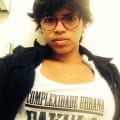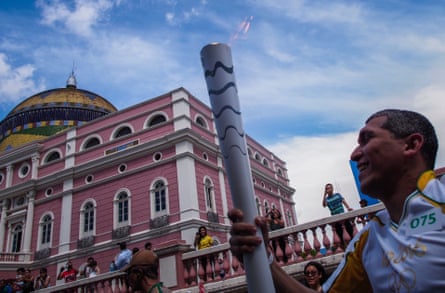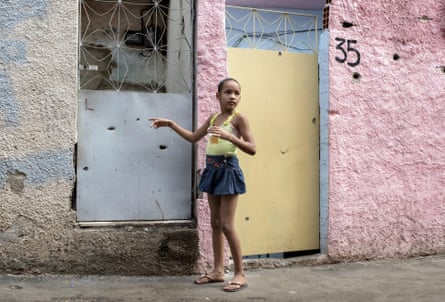1 June
A new month, but the same old soundtrack. It is almost 11am and the children of the neighbourhood will soon be heading back from school. I see their parents head out to collect them. But on the way, their looks turn to apprehension as they enter the street; they look up anxiously at the sound of intense gunfire. This is happening now in the Nova Brasilia favela in the Complexo do Alemão.
And, from the window of my little house, I watch the street – sitting at my desk.
From here, I can see the fear in people’s eyes. Nobody knows when or whom the next stray bullet might strike. Our favela has many alleys, so each shot has the potential to find someone sitting at home or walking along the street. The odds are the same.
Among all the comings and goings outside, I notice a child accompanied by someone who appears to be a grandmother. The adult, long accustomed to the sound of gunfire, is walking quietly and steadily towards their destination. The child hurries along, eyes looking up fixedly at their companion.
At every step, there seems to be a burst of gunfire. The child, who looks about six or seven, starts to fire questions at the adult. Has it stopped? Are we done yet?

The same questions pass repeatedly through my head.
4 June
I have just seen about 50 heavily armed police in Grota, one of the busiest communities in the Complexo do Alemão. In their black uniforms, they stood out in the middle of a small crowd. It is the day of the street market and the street is full of people, families, market-goers, bags and guns. It could almost be an ordinary day when nothing memorable happens – except that I was woken up by a police helicopter right above my house.
It is a scene I have witnessed many times. As if the general atmosphere of terror isn’t enough, a black body wrapped in a sheet is carried out of the favela. It’s strange how the militarisation of one part of the city is acceptable for a certain part of society. The police cannot mediate a conflict that it is part of. The UPP [pacifying police unit] project that promised the pacification of the Complexo do Alemão has not worked for favela residents, who now have to live with this daily reality. Every time I leave home, it feels as if three guns are pointed at my head. This has to end.
5 June
Just before the UPP pacification began in Alemão, many families were evicted from their houses. The government announced that new houses would be built for these registered residents. During the construction process, they received a monthly payment to cover their rent in another part of the city. In one of the affected areas – Favelinha da Skol – on one of the only walls left standing amid a mountain of debris, it is just possible to make out the words condemning the former state governor: “[Luiz Fernando] Pezão lied”.
The monthly payment that was to have been paid to such residents was cancelled. These people have nowhere to live. The government lies to favela residents. It lies, not just when it promises they will live in peace, but when it promises investment in education, basic sanitation and culture. On the eve of new elections, posters and banners will appear, promising better days.
9 June
Gunfire.
13 June
Gunfire.
19 June
On television I follow the Olympic torch passing through several cities in Brazil. Nearer home, there is a major confrontation. Police are everywhere. The atmosphere is horribly tense – I cannot leave the house; the shots are too close. Instead, I wait, hoping that eventually the gunfire will end.
Roseli Jesus had a different fate to me today. In her 32nd year, she was shot in the back in the community of Fazendinha on the highest point of the hill. She died instantly. Another resident, 19-year-old Luiz Felipe Alves, was shot in the same place and had to be taken to hospital, but he is doing OK.
The police should represent security and guarantee citizens’ rights, but here in Alemão they represent tension and the fear of death. This is because the police enter the favela [accepting that they may] kill. You can see it in the way they look at people, in their tactics, their fear.
The police operation intensified in the run-up to the Olympics, and so did the deaths. The state looks on the favela as a problem.

22 June
A distressing day. I’m at my internship but my phone is buzzing with messages that the Complexo do Alemão is in flames! Throughout the day at various locations, people simultaneously report hearing shots. I do not know how to get home. The clashes and police operations do not follow any schedule, and in this war everyone suffers.
Isabel Martins, 30, is hit by a bullet in the Alvorada community. It wounds her arm. She didn’t realise, but a gunfight was going on there. A policeman was also hit in the thigh in a shoot-out in the neighbourhood of Nova Brasilia, where I live.
Many people believe the UPP will end soon after the Olympics, but I don’t believe that. But I respect this and even think that people have this as a hope, perhaps it gives the community motivation to carry on in the face of so many painful stories. I believe that the most respectful attitude of the government would be to withdraw their forces from Complexo do Alemão, given the almost daily reality that I describe. The UPP has not worked here. Yes, we want policing, but not a policing that sees us residents as targets – [we want] a police who, above all, respect us as citizens.
1 July
I am woken at 7am by shots that sound very close. The noise echoes through my little house. At times like this, I think about leaving Alemão. But I love living here among my family and childhood friends. I feel happy walking up the main street chatting to the traders. I like the hustle and bustle on every corner and I love joking around with the boys who drive the motorcycle taxis.
The moto-taxi drivers are very important to the favela. The streets are narrow and there are no tram lines. The cable car is not really integrated into the community, because the stations are hard to reach, so the only people who use it are those on one side of the top part of the hill, and tourists.
On days when there is shooting, such as now, the whole routine of the favela changes. Besides the tense atmosphere, it is hard for people to return home and sometimes even the moto-taxis stop working because it is too dangerous. Then there is less trade and less money for many families. One way or another, a single bullet has an impact on the routine of the more than 120,000 people who live here.
6 July
A mobile phone video of an anxious family in a cable car gondola listening to shots ring out below them in Alemão goes viral. The mother, who is there with three children, shows the family’s desperation as the gondola slows down because of the gunfight, making their journey over the danger area even longer.

19 July
The last two months have been very tense in Alemão. Over the past 48 days I have counted at least 25 days where a gunfight was reported in different communities in Alemão. Since the beginning of June, two residents have been killed in the shooting and another five, including two police, have been injured.
My feeling is that Alemão was better off in the past when it was abandoned [by the state]. Now, I believe the state looks at us with the eyes of an assassin. A common saying among our group of social activists in Alemão goes like this: we ask for public healthcare and the authorities send police. We ask for more culture, the government understands “police”. When we ask for better transport so we can reach other parts of the city, the state hears “police”. We ask for peace, but all we get is war.
I hope the Olympic Games are over soon because the only legacy I see is repression, militarisation and war. It’s time for this to end.